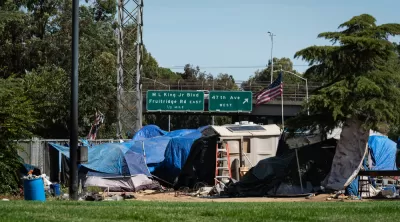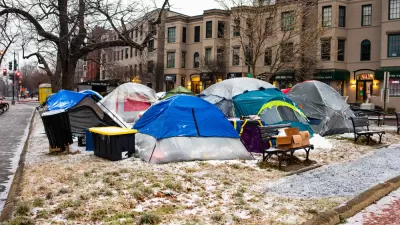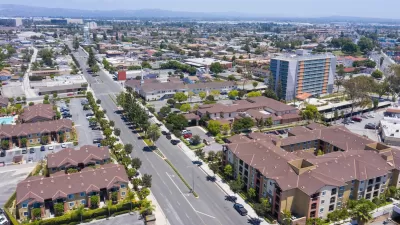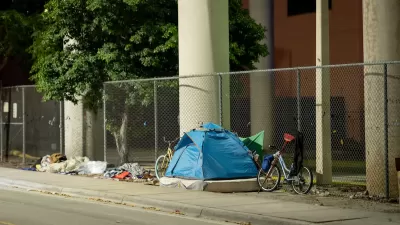Advocates for unhoused people are calling on the city and county to provide more resources for supportive housing, open more cooling centers, and build more shelter beds.

A federal judge ruled that Sacramento can’t displace unhoused residents living in encampments until at least the end of August, reports Melanie Wingo for KCRA. “As part of its rationale for the ruling, the court made note of the Sacramento area's summertime temperatures.”
The ruling came in response to an action filed by the California Homeless Union. “Every time the city, either through the police, or code enforcement, or utilities department, breaks up an encampment, they exile people into the streets and areas away from where they had some means of protection,” said Anthony Prince, CHU lead organizer and general counsel.
In addition to calling for more resources to place people in permanent supportive housing and make more affordable housing available to low-income residents, “The California Homeless Union also asked the court to require Sacramento County to open more cooling centers and extend cooling center hours.The judge did not do that, according to Prince.”
The city disputes the assertion that it has been conducting sweeps. According to a statement from the city, they “will be back before the court when the injunction expires in order to ‘inform the Court that it has not been sweeping encampments and welcomes the opportunity to continue to clarify its position and unhoused protocols – especially surrounding critical infrastructure — and to explore solutions with community partners.’”
Meanwhile, an article by Theresa Clift in the Sacramento Bee relates that “The Sacramento City Council could pull or alter a measure it placed on the November ballot that would force the city to provide more shelter for homeless residents, according to the lead proponent for the initiative.” The same article notes that roughly 9,287 people experience homelessness nightly in Sacramento, twice as many as in January 2019.
FULL STORY: Federal judge blocks 'sweeps' of unhoused people in Sacramento

Maui's Vacation Rental Debate Turns Ugly
Verbal attacks, misinformation campaigns and fistfights plague a high-stakes debate to convert thousands of vacation rentals into long-term housing.

Planetizen Federal Action Tracker
A weekly monitor of how Trump’s orders and actions are impacting planners and planning in America.

San Francisco Suspends Traffic Calming Amidst Record Deaths
Citing “a challenging fiscal landscape,” the city will cease the program on the heels of 42 traffic deaths, including 24 pedestrians.

Defunct Pittsburgh Power Plant to Become Residential Tower
A decommissioned steam heat plant will be redeveloped into almost 100 affordable housing units.

Trump Prompts Restructuring of Transportation Research Board in “Unprecedented Overreach”
The TRB has eliminated more than half of its committees including those focused on climate, equity, and cities.

Amtrak Rolls Out New Orleans to Alabama “Mardi Gras” Train
The new service will operate morning and evening departures between Mobile and New Orleans.
Urban Design for Planners 1: Software Tools
This six-course series explores essential urban design concepts using open source software and equips planners with the tools they need to participate fully in the urban design process.
Planning for Universal Design
Learn the tools for implementing Universal Design in planning regulations.
Heyer Gruel & Associates PA
JM Goldson LLC
Custer County Colorado
City of Camden Redevelopment Agency
City of Astoria
Transportation Research & Education Center (TREC) at Portland State University
Jefferson Parish Government
Camden Redevelopment Agency
City of Claremont





























